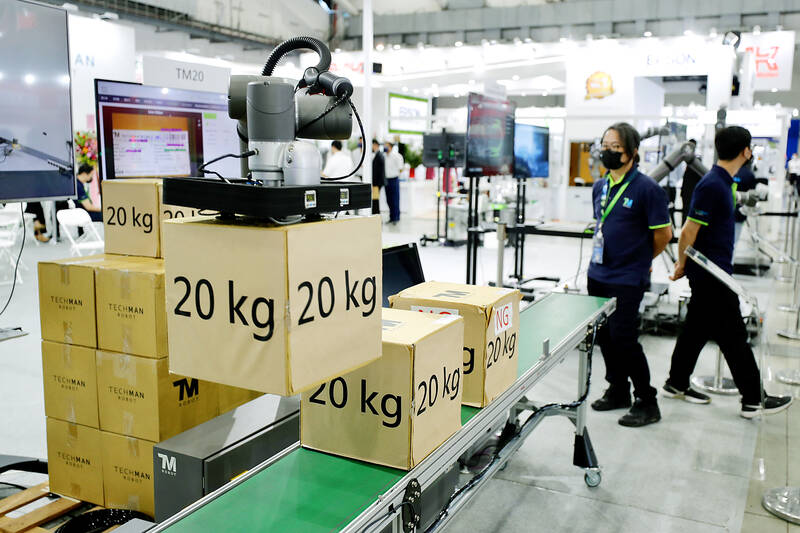The nation’s manufacturing output in the first quarter fell 13.59 percent year-on-year to NT$4.22 trillion (US$137.7 billion), as slowing global trade, weakening demand and ongoing inventory adjustments dragged down manufacturers’ capacity utilization, the Ministry of Economic Affairs said in a statement yesterday.
It was the second consecutive annual decline following a fall of 5.73 percent three months earlier, as firms in both technological and traditional industries posted a nearly across-the-board decline in production, the ministry said.
In the electronic components industry — the manufacturing sector’s most important segment — output decreased 16.85 percent to NT$1.25 trillion last quarter, ending 13 consecutive quarters of annual increases since the fourth quarter of 2019, ministry data showed.

Photo: Ritchie B. Tongo, EPA-EFE
Output by the chip industry fell 11.22 percent to NT$778.6 billion last quarter, as IC designers and DRAM makers lowered production to cope with weakening demand for electronic products and persistent inventory adjustments at semiconductor customers, the ministry said.
In addition, LCD panel makers reported declining output due to weakening demand for new applications and falling prices compared with a year earlier. As a result, production value last quarter decreased 46.52 percent to NT$108.8 billion, it said.
In comparison, suppliers of computers, and electronic and optical components continued to expand their production on the back of robust demand for cloud-based, data center-related equipment, while a major improvement in key components boosted production of servers and networking equipment, with output growing 5.15 percent year-on-year to NT$262.5 billion, increasing on an annual basis for the 18th consecutive quarter, the ministry said.
In traditional industries, producers of chemical materials and fertilizers last quarter posted a decline of 28.1 percent year-on-year to NT$392.6 billion, suppliers of base metals reported that their output declined 20.01 percent to NT$381.2 billion, while output at makers of machinery equipment decreased by 18.6 percent to NT$205.5 billion, it said.
The declines mainly reflect the effects of a slowing global economy, the ministry said, adding that manufacturers implementing annual maintenance and customers becoming more conservative in investment were also factors behind the fall in production.
The automobile and vehicle parts industry’s output grew 3.39 percent year-on-year last quarter, as some new car models sold well and a shortage of components eased, it said.
The ministry said the outlook for the domestic manufacturing sector would still be weighed by weak demand amid global inflation and monetary tightening by central banks, as well as the conflict between Russia and Ukraine and US-China technology disputes.
However, potential business opportunities in high-performance computing and automotive electronics, as well as emerging technology applications such as artificial intelligence, could help inject some growth momentum into local manufacturing sector going forward, it said.

Semiconductor shares in China surged yesterday after Reuters reported the US had ordered chipmaking giant Taiwan Semiconductor Manufacturing Co (TSMC, 台積電) to halt shipments of advanced chips to Chinese customers, which investors believe could accelerate Beijing’s self-reliance efforts. TSMC yesterday started to suspend shipments of certain sophisticated chips to some Chinese clients after receiving a letter from the US Department of Commerce imposing export restrictions on those products, Reuters reported on Sunday, citing an unnamed source. The US imposed export restrictions on TSMC’s 7-nanometer or more advanced designs, Reuters reported. Investors figured that would encourage authorities to support China’s industry and bought shares

FLEXIBLE: Taiwan can develop its own ground station equipment, and has highly competitive manufacturers and suppliers with diversified production, the MOEA said The Ministry of Economic Affairs (MOEA) yesterday disputed reports that suppliers to US-based Space Exploration Technologies Corp (SpaceX) had been asked to move production out of Taiwan. Reuters had reported on Tuesday last week that Elon Musk-owned SpaceX had asked their manufacturers to produce outside of Taiwan given geopolitical risks and that at least one Taiwanese supplier had been pushed to relocate production to Vietnam. SpaceX’s requests place a renewed focus on the contentious relationship Musk has had with Taiwan, especially after he said last year that Taiwan is an “integral part” of China, sparking sharp criticism from Taiwanese authorities. The ministry said

US President Joe Biden’s administration is racing to complete CHIPS and Science Act agreements with companies such as Intel Corp and Samsung Electronics Co, aiming to shore up one of its signature initiatives before US president-elect Donald Trump enters the White House. The US Department of Commerce has allocated more than 90 percent of the US$39 billion in grants under the act, a landmark law enacted in 2022 designed to rebuild the domestic chip industry. However, the agency has only announced one binding agreement so far. The next two months would prove critical for more than 20 companies still in the process

CHANGING JAPAN: Nvidia-powered AI services over cellular networks ‘will result in an artificial intelligence grid that runs across Japan,’ Nvidia’s Jensen Huang said Softbank Group Corp would be the first to build a supercomputer with chips using Nvidia Corp’s new Blackwell design, a demonstration of the Japanese company’s ambitions to catch up on artificial intelligence (AI). The group’s telecom unit, Softbank Corp, plans to build Japan’s most powerful AI supercomputer to support local services, it said. That computer would be based on Nvidia’s DGX B200 product, which combines computer processors with so-called AI accelerator chips. A follow-up effort will feature Grace Blackwell, a more advanced version, the company said. The announcement indicates that Softbank Group, which until early 2019 owned 4.9 percent of Nvidia, has secured a